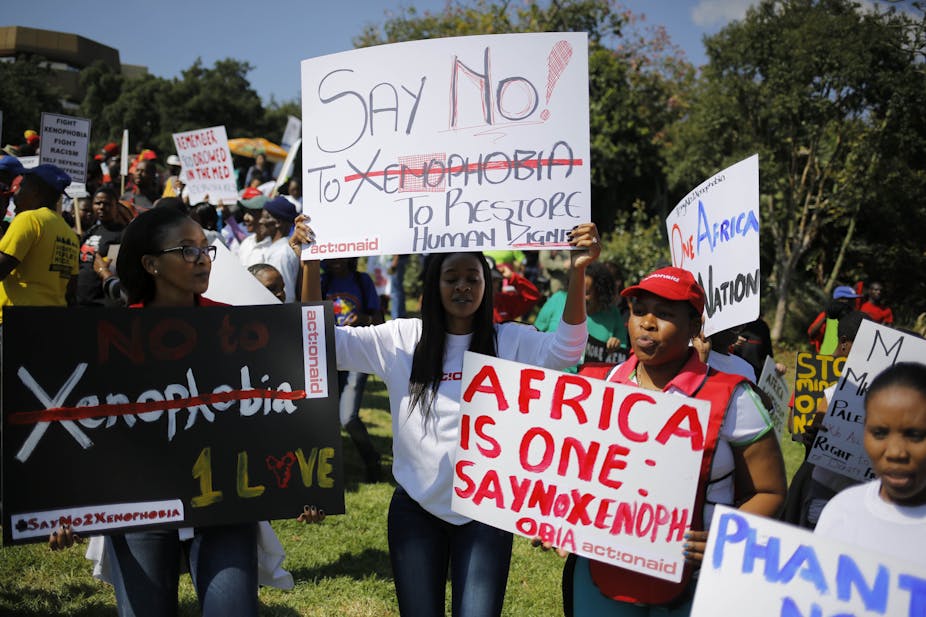As elsewhere in the world, migration is increasingly at the centre of South Africa’s public and political debate. For the first time, the country’s official opposition party, the Democratic Alliance (DA), has released a document outlining its “immigration plan” for the country. In advance of next year’s national election, this is the first of many policy documents intended to distinguish the party and win voter support. In a country where many citizens are uncomfortable with current migration patterns, this is an important, if contentious, move.
This pandering to populism signals heightening competition in South Africa’s electoral politics. The party is smelling electoral blood, most importantly the possibility of winning Gauteng, the country’s most populous province and its economic hub, in next year’s elections. In the 2016 municipal elections, the party made significant gains against the long dominant African National Congress (ANC). Following those elections, the party now governs the country’s most important cities– Johannesburg (the country’s largest city), Tshwane (administrative capital) and Cape Town (South Africa’s second city and legislative capital). In next year’s general elections, they look to expand their provincial mandates beyond the Western Cape.
After years as a small minority party, the DA is now seeking a platform that can reach beyond its traditional white, wealthy base. Against accusations of racism within the party and concerns that it is out of touch with the poor majority, the DA is grasping for policies to attract new black voters without alienating its current constituents. Given widespread popular concerns about the levels of immigration from neighbouring countries (particularly Zimbabwe and Mozambique), South Asia and China, this is an issue that can reach voters across the economic and racial spectrum.
The problem is that the DA’s new immigration proposal offers little new. Worse, with policies like this, the party is falling into the same trap as the ANC: offering policies that are vague and founded on fantasy not fact.
Like the ANC, the DA’s desperate politics plays to populism. There was a time when the DA tried to sell South Africans on a technocratic state founded on facts and bureaucratic capacity. This proposal reflects a shift to policy formation founded on myth and political expediency.
The plan
While the DA’s immigration plan
openly rejects all anti-immigrant sentiment and ‘build a wall’ paradigms
it nevertheless puts forward a flawed understanding of immigration, namely that South Africa’s considerable social problems – crime, unemployment, inequality, poverty – are somehow attributable to immigration and bad border control.
The party’s position reads like a post-hoc justification for its Johannesburg Mayor Herman Mashaba’s continued rhetorical assault on undocumented immigrants.
Like him, the policy proposal recognises the contributions highly skilled migrants make in boosting businesses and creating jobs. But, apart from the wealthy and educated, immigrants remain unwanted. Here the policy echoes statements from across the political spectrum accusing foreigners of promoting corruption while eroding the country’s security, social cohesion and prosperity.
It is convenient to burden immigrants with the country’s social ills, but the facts simply do not support this. South Africa doesn’t have perfect data, but all scientific analysis indicates foreigners make up only between 3%-5% of the total population of the country’s 55 million residents.
And South Africa isn’t an exception – the numbers of immigrants are similar to many other countries. Even if it does receive the most immigrants of any African countries these are simply not enough people to explain the country’s high levels of crime, corruption and unemployment.
More of the same
The DA’s immigration policy reflects little empirical research. Nor does it distinguish itself from ANC policy as the party boasts. Instead, large sections of this policy appear cribbed from the ANC-drafted “White Paper” on International Migration. Perceived problems with porous borders and corruption are precisely why the ANC has proposed a border management agency.
For its part, the DA argues for a migration agency that would be nominally more democratically accountable. But this is much of a muchness. Even the DA’s big push for highly skilled immigrants to meet the needs of big business is reflected in ANC policy.
The DA’s policy also echoes the twisted humanitarian logic that has informed European responses to migration and the ANC’s own immigration policing efforts. Across all of them, the argument runs that protecting migrants demands that they are legally in the country. Yet rather than open channels for people to obtain legal documents and status, the DA proposes restricting them. Only those who come properly and in line with stringent admission requirements can stay.
This is why European countries have largely banned rescuing migrants in the Mediterranean lest they encourage unsafe migration. It is also the same impulse that motivated the ANC-led government’s “Operation Fiela” in 2015 that saw the arrest of tens of thousands of migrants to protect them from xenophobic attacks. This is a perverse humanitarian logic used to disguise an underlying isolationist nationalism. Although it intends this as a means of challenging the ANC, the DA is in fact very much on the same side.
Political expediency
The DA’s immigration policy is also without vision. It is reactive – primarily to the ANC’s perceived shortcomings.
Both parties are appeasing South Africans by promising a sense of control. In fact, lessons from other countries suggest that it isn’t immigration, per se that bothers voters. Instead, consternation arises from perceived threats to order. Immigration is a distraction.
There are real problems such as human rights abuses and corruption at the border, as well as challenges for low-skilled South Africans competing with undocumented migrants. But addressing these will not create the physical or economic security South Africa needs. Informed by the same sentiments of fear and exclusion that led to Brexit and US President Donald Trump’s election, they are distractions.

